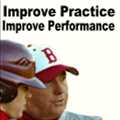Baseball Instruction - Hitting Your Cut Off Man
By Nate Barnett
The next time you are at a youth baseball game, count the amount of times the throw comes in from the outfield and travels
far over the head of an infielder to it's destination. Next, count how many runners advance to the next base. The number will
astonish you.
Using the cut off man is a simple procedure but strangely fails to end up in much baseball instruction. First, let me share
with you the importance of this skill, and secondly, how to teach it.
The Importance
The importance of using the cut off man is obvious to a baseball outsider if explained correctly. And if it's obvious to
an outsider, the importance should be glaring to those involved in baseball.
The problem usually occurs and makes a significant impact on an inning when there is at least one runner on base. For example,
say there is a ball hit to right right field with a runner on first base. The right fielder picks up the ball and throws over
the second baseman's head in an attempt to get the runner at third base. Because of the length of the throw, the runner going
to third is safe and the batter upon seeing the throw sneaks on to second base. The defense now has to deal with runners on
second and third rather than first and third. The problem that could have been prevented is two-fold. First, there is no possibility
for a double play because the hitter advanced to second. Secondly, a base hit will now likely score two instead of one. So
how important was the missed cut off man now? Could mean the game. If this problem occurs multiple time each game, as I've
seen on numerous occasions, the chances of winning reduce dramatically. I will also say that if this is not worked on consistently,
there is high probability that this mistake will continue to be made.
Baseball Instruction: Teaching the Relay
1. Emphasize the importance of outfielders throwing to the cut off man early in the season during practice. It has to become
a cultured understanding on the team so that everyone is thinking about it whenever there is a ball hit to the outfield. That
way, a missed cut off man by an outfielder gets the same response as if a hitter took off running to third base out of the
box. Amazement.
2. Emphasis without practice is useless. The good thing about practicing throwing to your cutoff man is that you can work
on it during other baseball drills and activities. Stopping play when a mistake is made is a must to talk over again why hitting
a cutoff man should be mandatory. This way, mistakes aren't let slide.
3. A good way to help outfielders understand where to throw the ball is to have your infielders line themselves up between
the outfielder and the destination of the throw. Outfielders will then learn to anticipate an infielder being a certain spot
based on the depth of the ball being retrieved.
About the Author
Nate Barnett is owner of BMI Baseball http://bmibaseball.com and is based out of Washington State. His expertise is in
the area of hitting, pitching, and mental training. Coach Barnett's passion is working with youth in helping expand their
vision for their baseball future. After finishing a professional career in the Seattle Mariners Organization, Nate pursued
his coaching and motivational training career. His instructional blog is located at http://bmibaseball.com/blog
His new FREE ebook, Toxic Baseball: Are you polluting your game? can be found on the main BMI Baseball website.
Hitting 101, an ebook on complete hitting mechanics will be released by June 1st, 2008. Features include numerous illustrations,
video clips, and a special offer to discuss your hitting questions over live on the phone strategy sessions.

